From internal knowledge to call etiquette and system features like transferring and forwarding, call center agents need extensive training to succeed. With the best call center training software, agents can quickly develop critical skills so they can confidently deliver exceptional customer experiences.
There are dozens of options on the market, but these five are my top picks for most call centers.
Top call center training software comparison
The best training tools are LMS, coaching, and blended learning platforms. While they aren’t specifically built for call center training, you can integrate them with various tools, customize their prebuilt courses, create custom learning paths, and adapt them to match your needs. The table below compares some of the most important capabilities to consider.
| Best for | Starting price | Free trial | Prebuilt courses | Integrations | |
|---|---|---|---|---|---|
| Seismic | Best overall | Custom quote | Demo only | No | 100+ |
| TalentLMS | Best for onboarding | $69 per month | Up to 10 courses | Add-on | 40 + Zapier |
| SC Training | Best for in-person call centers | $24 per admin + $5 per learner per month | 30 days | 1,000+ | 11 + Zapier |
| Paradiso LMS | Best for remote call centers | Custom quote | Yes | 100k+ | 100+ |
| Litmos | Best for ready-to-access training | Custom quote | 14 days | 80k+ (add-on) | 100+ |
Seismic: Best call center training software overall

With a well-rounded approach that includes learning, coaching, and skill development tools, Seismic is a one-stop shop for call center training. This combined with its hands-on training capabilities and customization opportunities give you everything you need to onboard and level up your agents.
Why I chose Seismic
Whether you want to get new agents up to speed in a hurry or develop existing employees, Seismic’s learning platform gives you everything you need. While it doesn’t have prebuilt courses, it has every other feature you could possibly imagine.
One of my favorite features is the ability to create practice sessions — these make it easy for agents to quickly grasp the tools they need to do their job. For example, they can rapidly accelerate software-specific knowledge, master cold call scripts, and learn how to effectively approach customers in a variety of situations.
With built-in coaching, supervisors can pinpoint knowledge gaps, allowing them to focus on areas with room for improvement.
Pricing
Seismic pricing is based on a custom quote, depending on what you need. You can mix and match all of these products to create a custom training and enablement platform for your team.
It offers a full suite of sales enablement tools:
- Enablement Cloud: Everything Seismic offers in one solution.
- Seismic Content: Manage internal and external content production.
- Seismic Learning: Training and coaching platform.
- LiveDocs: Dynamic document and presentation creation.
- LiveSocial: Curate, produce, and monitor sales content on social media.
- Digital Sales Rooms: Customizable portal for potential buyers.
- Aura Copilot: An AI assistant for sales and service agents.
- Seismic for Meetings: Helps reps prepare, present, and follow up on sales calls.
Features
- Collection Hubs to organize training resources.
- Full document and knowledge base creation capabilities.
- Automatic marketing and sales asset creation.
- Drag-and-drop course creation with dozens of options.
- Learning paths adapt to each user’s needs.
- Fully white labeled solution to match your brand.
- Suite of AI tools for lesson creation and sentiment analysis.
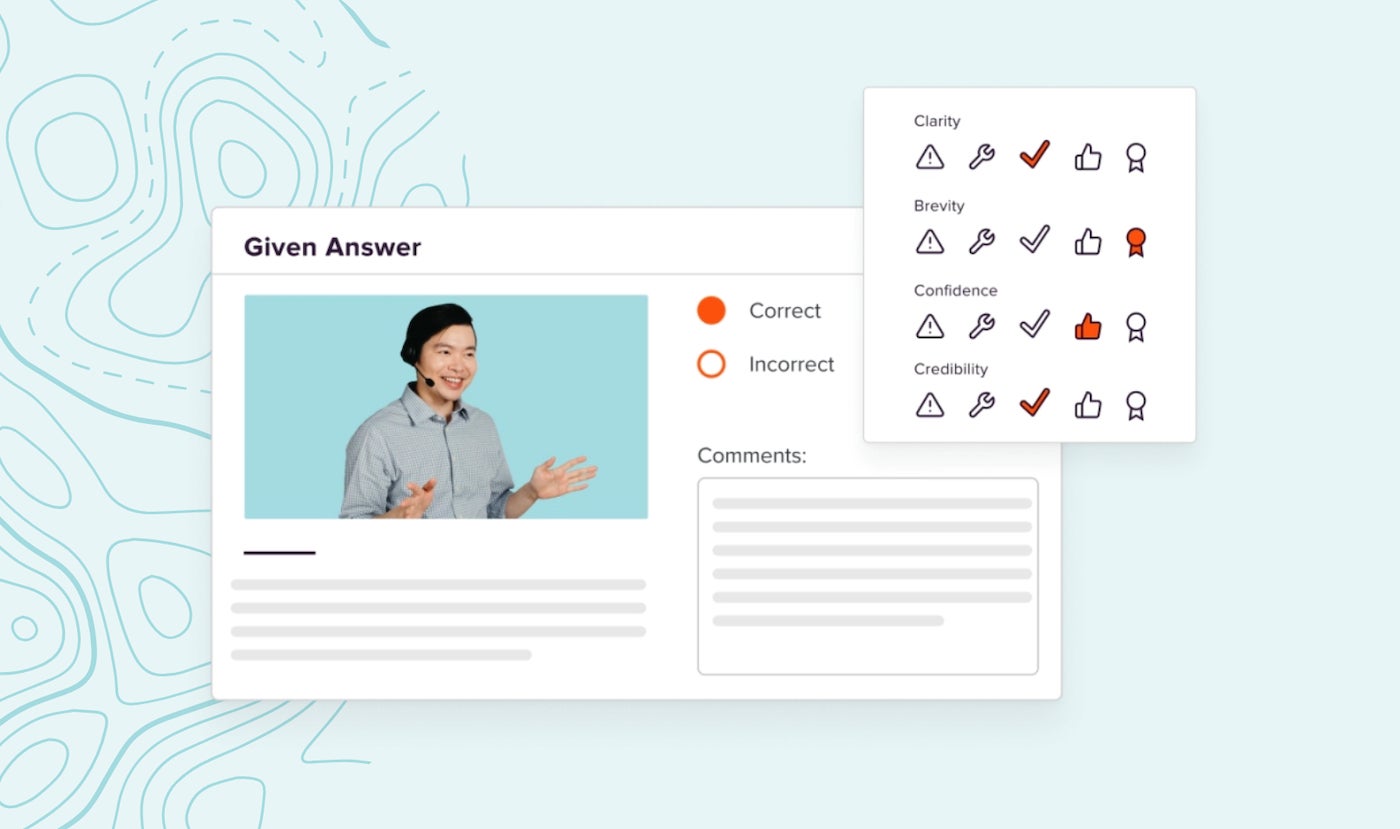
Pros and cons
| Pros | Cons |
|---|---|
| Built for sales and service teams. | Not for small businesses. |
| Used by thousands of businesses. | More expensive than other options. |
| Excellent user interface. | Overwhelming number of capabilities. |
| Comprehensive learning platform. | No free trial. |
| Teach, train, and test however you want. | |
| Monitor progress and track impact. | |
| Full suite of sales-enablement tools. | |
| Many agents are fully ramped in 10 days or less. |
TalentLMS: Best for onboarding
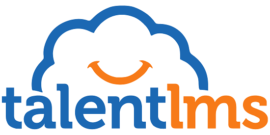
TalentLMS offers a user-friendly platform designed to streamline the onboarding process. With its intuitive course creation tools, gamification features, and live sessions, it’s a great option for call centers that need to get their agents up to speed as fast as possible. From small businesses to enterprises, it’s an approachable solution with plenty of room to grow.
Why I chose TalentLMS
Where Seismic is comprehensive, advanced, and expensive, TalentLMS is an affordable and small business–friendly alternative. Its drag-and-drop functionality makes it easy to create courses with images, video, and other types of media.
You can also easily create tests, quizzes, and comprehension surveys to ensure agents are equipped to handle real-world situations.
While it doesn’t offer the level of customization that more advanced platforms do, it shines for its ease of use and focus on essential functionality. There’s no complicated setup, long-term sales process, or drawn out onboarding period to get your learning environment up and running. All you have to do is sign up, start with a premade course, or get right to work building your first lesson in a matter of minutes.
Pricing
Rather than paying per user, you’ll pay a set price up to a certain number of users before moving into the next pricing bracket. The following prices are for up to 20 users:
- Core: $828 paid annually or $89 per month.
- Grow: $1,308 paid annually or $139 per month.
- Pro: $1,668 paid annually or $179 per month.
- Enterprise: Custom pricing for more than 1,000 users.
You can add TalentLMS’s library of premade courses to any plan for an additional $20 per month. The Pro plan also offers a flexible user limit option for an extra $50 monthly base fee plus $6 per user per month.
For those on a tight budget or anyone that wants to try it before they buy, there’s a free plan for up to five users and 10 courses.
Features
- Easy drag-and-drop content builder.
- Gamification to boost engagement.
- Live sessions for real-time training.
- Generative AI credits for lesson creation.
- AI-powered self assessment tools.
- Course assignment and user management automations.
- 1:1 messaging, calendars, and a discussion forum.
- Optional ecommerce functionality to sell courses.
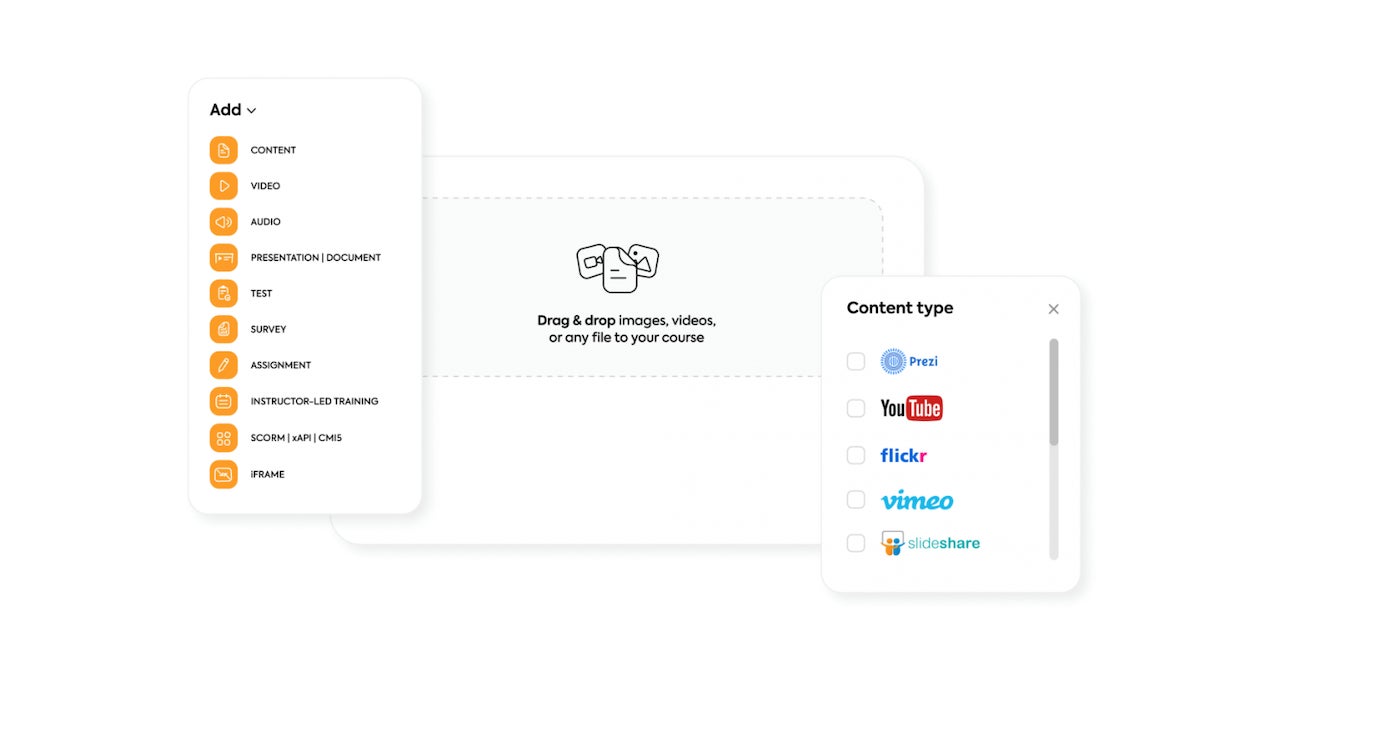
Pros and cons
| Pros | Cons |
|---|---|
| Forever free plan for up to 10 courses. | Not as comprehensive as others. |
| Simple and intuitive platform. | Limited customization options. |
| Scalable for businesses of all sizes. | Fewer prebuilt courses. |
| Various learner engagement tools. | Not focused on sales and support. |
| Comprehensive reporting options. | |
| Available in 40+ languages. | |
| Enterprise-grade features on more expensive plans. |
SC Training: Best for in-person call centers

SC Training, formerly known as EdApp, offers a range of blended learning tools for online and in-person training programs. It offers various ways to get your courses going, including building your own, leveraging AI, pulling from the prebuilt library, or hiring SC Training to create lessons for you.
Why I chose SC Training
Many training tools focus on online education, but SC Training has a wide range of tools for managing in-person and hybrid classes. From automated attendance tracking and quizzes that supplement live teaching to a dedicated in-person assessment tool, you get everything you need to engage your in-person, hybrid, and online learners.
The virtual classroom feature makes it easy to work with in-person and online learners at the same time.
SC Training’s customizable course templates are also unique compared to other solutions. Instead of a full prebuilt course that you have to overhaul, you get a flexible outline to work with instead.
Pricing
SC Training offers three plans to choose from:
- Free: For up to 10 learners.
- Premium: $24 per administrator + $5 per learner per month.
- Enterprise: Custom pricing for more than 500 users.
Every plan includes access to the entire library of editable courses, gamification features, customizable branding, and AI text generation capabilities. Paid plans let you add unlimited users, provide AI translations, enable groups and learning paths, and unlock social learning options.
Features
- AI-powered course creation tools.
- Library of over 1,000 editable courses.
- 80+ customizable course templates.
- Gamification to enhance learning.
- Recurring options for regular compliance.
- Automatic attendance tracking.
- In-person assessment tools.
- Built-in analytics for tracking performance.
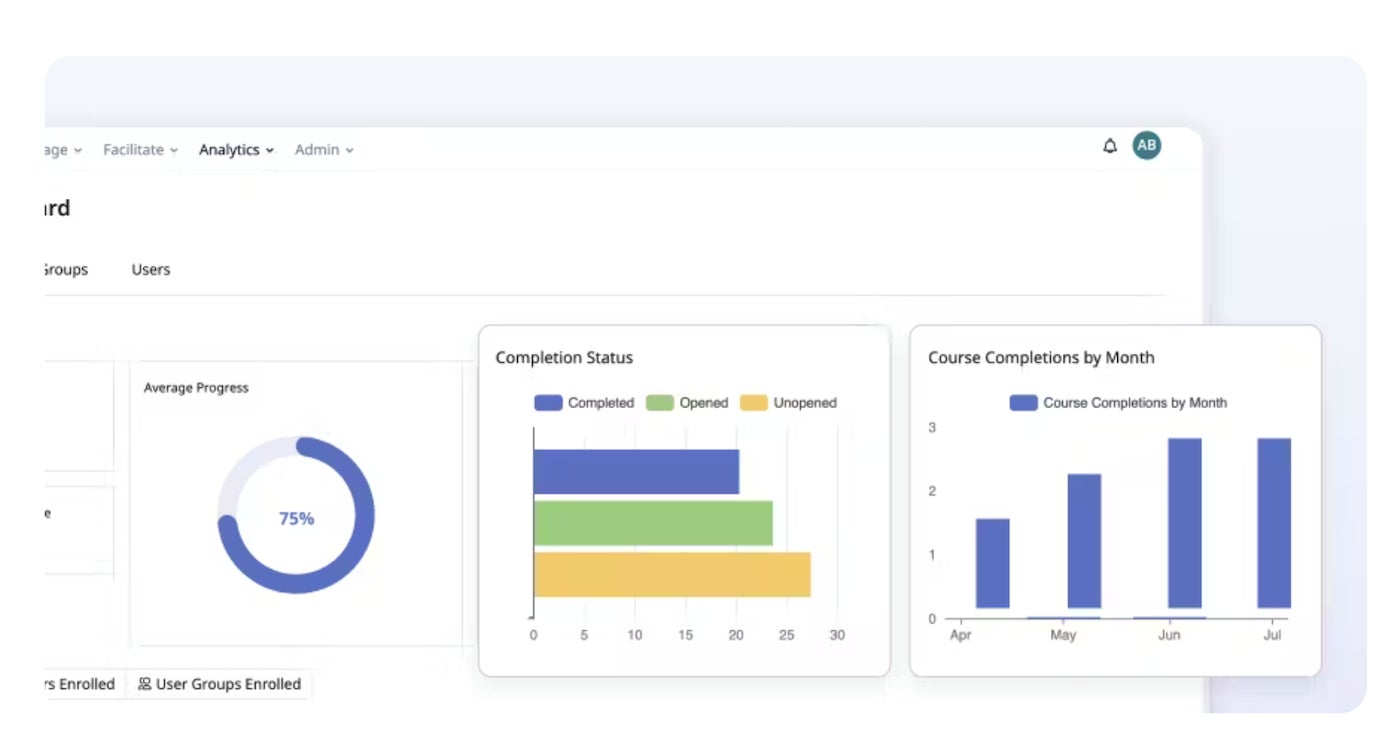
Pros and cons
| Pros | Cons |
|---|---|
| Affordable for smaller teams. | Limited scenario-based options. |
| Built-in AI simplifies course creation. | Lacks advanced reporting features. |
| Excellent customer service. | Not ideal for enterprise situations. |
| Optional done-for-you lessons based on your requirements. | May not be great for managing numerous complex learning paths. |
| Large range of templates and prebuilt courses you can customize. | |
| Blended learning options, including tools for in-person and hybrid training. | |
| Feature-rich free plan or 30-day free trial of premium features. |
Paradiso LMS: Best for remote call centers

Paradiso LMS is a remote-friendly training platform for teams with at least 100 users. While most of the tools I’ve already covered can work well for online learning, this solution comes with a wider range of customizable modules to match your digital training needs.
Why I chose Paradiso LMS
It has features specifically for remote learning and customization capabilities that you won’t find with other platforms. One of its most interesting tools is Paradiso LXP, which adds a new layer of personalization, social, and collaborative learning for distributed teams. With automatic lesson recommendations, customizable dashboards, and social gamification, you get everything you need to engage learners no matter where they are.
Its online proctoring suite is also one I haven’t seen elsewhere. It provides AI-based cheating detection, eye gaze monitoring, and video monitoring options for ensuring the integrity of your online exams.
The ability to sell courses on the same platform makes it a strong solution for learning management across your entire business.
Pricing
Although Paradiso LMS doesn’t list their prices, there are two plans to choose from:
- Professional: For small and midsize companies with at least 100 learners.
- Enterprise: For teams with more than 2,000 learners.
Both plans include all core features, white labeling, and implementation support. The enterprise plan includes 100 customization hours, advanced integrations, multi-tenancy functionality, and advanced security. However, there are add-ons for both plans, including AI authoring and tutoring plus access to integrations.
They may also charge extra for features that require extra development time from their team.
Features
- Virtual classroom for real-time online learning.
- Generative AI tools for lesson and course creation.
- AI-powered media studio for creating lifelike teachers.
- Interactive videos to engage learners.
- Multilingual support for global teams.
- Social and collaborative learning features.
- Integrations with more than 100 other tools.
- Online assessment and proctoring functionality.

Pros and cons
| Pros | Cons |
|---|---|
| Comprehensive online learning suite. | No free plan. |
| Tools for learners in other languages. | AI and integrations cost extra. |
| Top-tier user experience. | Add-ons can quickly increase the already higher price tag. |
| Award-winning platform. | Not suitable for smaller businesses. |
| Massive library of more than 80k prebuilt courses in all industries. | |
| A collaborative and interactive environment for remote teams. |
Litmos: Best for ready-to-access training

Don’t have time to create your own courses? Litmos offers the most comprehensive library of off-the-shelf courses for customer service, sales, and soft skills to help agents succeed. You don’t have to build anything from scratch as you can just pull from the library to create extensive learning paths — it’s one of the fastest ways to get your platform up and running.
Why I chose Litmos
Other solutions on this list also include ready-made courses, but Litmos has a larger selection of options specifically for customer support and sales teams. For example, you’ll find comprehensive trainings for account management, managing customer feedback, handling customer complaints, and communicating with customers. These can all be assigned to your agents in a few clicks without you having to write a lesson plan or single line of text.
I also like that you can set up regional compliance courses and certifications just as easily. No more guessing what agents need to know or when their certifications expire. Litmos keeps track of everything for you.
Pricing
You won’t find Litmos pricing online. However, there are three plans to choose from:
- Foundation Suite: For small teams with under 100 learners.
- Premier Suite: For mid-market companies with a global workforce.
- Platinum Suite: For enterprise companies needing advanced engagement and analytics.
LItmos’s content collections are also available as add-ons if you need more than what your plan includes. You’ll be able to choose from regional compliance packages and additional off-the-shelf courses. Their Salesforce Connector is another add-on that makes it possible for agents to learn directly within Salesforce.
Features
- Extensive library of customer service and sales courses.
- More than 80k off-the-shelf courses in total.
- Built-in content creation tools for creating your own courses.
- Available in more than 35 languages.
- Detailed reporting on course performance.
- An AI assistant for every user on every plan.
- Option to schedule expert-led courses.
- AI-powered course discovery and recommendations.
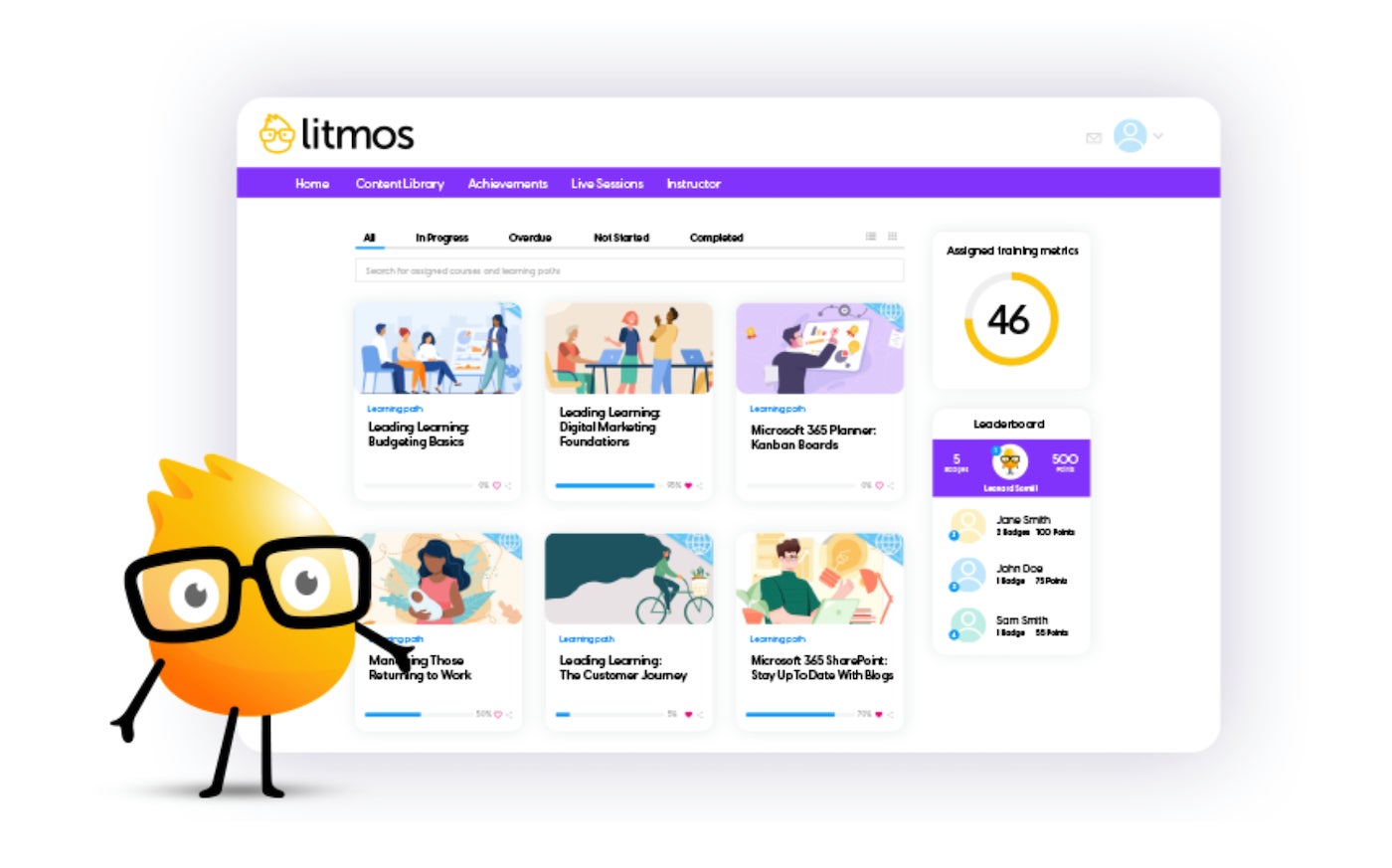
Pros and cons
| Pros | Cons |
|---|---|
| Rapid deployment with minimal setup. | White labeling is only on some plans. |
| hundreds of premade soft-skill, service, sales, and regional compliance courses. | Not as customizable or scalable. |
| Works well for global workforces. | Limited advanced course creation features. |
| Simple and streamlined user interface. | Many premade courses cost extra, and it’s unclear which ones. |
| Multiple AI tools on every plan. | |
| No need to create your own content but you can if you’d like to. | |
| Free 14-day trial. |
How do I choose the best call center training software for my business?
Choosing the right solution starts with a clear understanding of your needs. The best place to start is identifying your learning environment (remote, hybrid, or in-person). For remote teams, interactive virtual learning, multilingual support, collaboration options, and socialization opportunities are key to keeping learners engaged.
If most (or all) of your learning is in person, blended learning tools that combine live training with self-paced modules, digital assessments, and managing all the moving pieces are more important.
You should also consider whether you want to tap into existing courses or write your own. If you have the time and expertise, developing custom courses is probably the better way to go. In that case, look for training software with comprehensive authoring tools, drag-and-drop course design, generative AI content creation, and customizable learning paths.
For faster implementation, prioritize solutions with a robust library of off-the-shelf courses. These save you a lot of time while maintaining professional, high-quality content.
Many also let you customize premade courses, which is a great middleground between the two.
From there, you can narrow it down further by considering the specific goals of your training program. If you’re primarily looking for an easy way to onboard new agents, software that’s easy to set up with built-in assessments might be all you need. But for more comprehensive training, like soft-skill development and compliance certifications, you’ll need more advanced capabilities.
Aside from that, the rest really comes down to preference. Be sure to try out several platforms, schedule live demos, and ask a lot of questions.
Methodology
I started with a comprehensive list of training and LMS platforms, then narrowed them down to the best options specifically for call centers. To do that, I paid close attention to the following factors.
Coverage and quality of prebuilt courses
Giant libraries of off-the-shelf courses are great, but topic coverage and quality matter more. I specifically looked for platforms with call center, customer service, and sales courses so you don’t have to start from scratch. On top of that, I prioritized solutions with a wide range of choices to make relevant training for onboarding, soft skill development, compliance, and other key areas as easy as possible.
While this is particularly important for businesses that don’t have time to create their own content, it could also be a great place to start for those that plan to develop custom training programs.
Tools for different learning environments
Call centers operate in various settings. Because of that, it was important to include a range of training methods for different environments, including remote, hybrid, and in-person. I prioritized platforms that offer blended learning capabilities for their versatility, but paid closer attention to the specific features they offer to facilitate learning in each scenario.
Customization capabilities
Being able to customize the platform and content of your courses is crucial to tailoring the learning experience around your agents.
While every software on my list has drag-and-drop capabilities and AI-powered content generation, I specifically looked at each platform’s ability to create truly unique courses. From adding your own company policies, adding advanced comprehension tools, and creating branded learning paths to embedding different types of media and fully customizable layouts, I intentionally chose to include a range of basic to advanced solutions.
Engagement features
Agent engagement was more of a core requirement for inclusion on my list. If a platform didn’t offer an adequate selection of gamification, quizzes, and assessment tools, I didn’t include it.
Analytics and reporting
Tracking performance, comprehension, and engagement is an important part of top-tier training. It enables you to identify areas for improvement, ensure compliance requirements, and equip your agents with all the tools they need. I looked closely at each platform’s analytics capabilities, focusing on their ability to provide real-time insights at an agent and team level.
From there, I chose call center training software that helps managers measure the effectiveness of their training programs and adjust as needed.
The learning experience
All of the factors above combine into perhaps the most important aspect of training software — the overall learning experience. It’s not enough to exceed in one or two areas. Everything should come together nicely into a centralized interface that makes it easy for learners to see what lesson comes next, participate in assignments, and track their own progress.
Cost
I specifically chose to include tools that cover a wide range of budgets, ranging from free to highly customizable enterprise-ready options.

